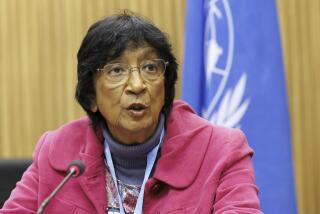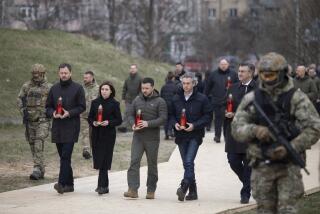Soviets Accused of Supervising Afghan Torture
- Share via
LONDON — Security forces in Afghanistan frequently torture political prisoners and Soviet personnel often watch, Amnesty International said today. Its report quoted Afghan men and women identified as victims.
The London-based human rights organization said it believes that torture in Afghanistan is “widespread and systematic.” Its 51-page report covers the period since Soviet troops entered the country in December, 1979, to help the Marxist government battle anti-Communist, largely Muslim guerrillas.
Amnesty International quoted former prisoners as saying that they were beaten, subjected to electric shocks, burned with cigarettes and that some of their hair was torn out.
Its report detailed widespread arrests of government officials, teachers, businessmen and students. Of those, it said some had opposed the Soviet-backed regime, but others were picked up on suspicion of being sympathetic to the rebels.
“From the testimonies of many former detainees, Amnesty International has been able to identify a . . . pattern of . . . torture and other ill treatment inflicted on prisoners,” the report said.
Most prisoners tortured were held in interrogation centers in Kabul, run by the intelligence agency known as Khad, Amnesty International said, but its researchers also interviewed people who said they were tortured at prisons and military posts.
Afghans the Actual Torturers
Former prisoners said Soviet personnel often were present, frequently directing or taking part in interrogations, but left the torture to Afghans, according to the Amnesty International report.
One 24-year-old student was quoted as saying: “My interrogator was an Afghan, but very often he was joined by an interpreter and a Soviet.
“I was never tortured by Soviets, but I saw many Soviets in rooms where torture was taking place. But I don’t know if the Soviets participated in the torture or if they gave orders for torture.”
A 26-year-old student arrested in October, 1984, said Soviet officials always were present during his interrogations.
“The act of torture is done by the Khad agents,” he said. “Soviets were present, but they only gave orders.”
Names of Victims Withheld
None of the approximately 100 former prisoners was identified. The report gave the experiences of 13 in detail.
Amnesty International said that the torture victims had been interviewed in Pakistan, India and Europe, where they live as refugees, and that they feared reprisals against relatives in Afghanistan if their names were revealed.
The human rights group said it has complained to Afghanistan about torture and other abuses several times since 1979 but received no reply.
In a statement accompanying the report, it said: “The organization has also written the Soviet state President Andrei Gromyko about the reported complicity of Soviet personnel in torture in Afghanistan.” It said the letter was sent Sept. 6 and Gromyko had not replied.
‘Beat Me for Hours’
A typical case of torture was that of a Kabul shopkeeper arrested in February, 1985, the report declared, and quoted him as saying:
“Two men took turns to beat me for some hours on the first day. They hit me, punched me, kicked me for an hour or two every day during my first week of detention.
“They started beating me again after my third week of detention. For about 45 minutes or an hour every day or otherwise at night, the beatings continued for 2 1/2 months.”
He said he was not beaten during the last month and “after the scars from my beatings had healed, they released me.”
Women prisoners said they were tortured, forced to watch men being tortured and that some were put in cells with the bodies of victims.
Left-wing military leaders seized power in Afghanistan in a 1978 coup and installed a pro-Soviet government headed by the first of a succession of Marxist leaders, Noor Mohammed Taraki. In 1979, when Taraki’s successor, Hafizullah Amin, was in control, the rebels were striking serious blows at demoralized government forces and the Soviets intervened in December under the recently concluded Soviet-Afghan friendship treaty.
The Soviet troops entered the capital of Kabul, and Amin was slain in another palace coup. Babrak Karmal was named to succeed Amin. Karmal, in turn, was replaced last May by Najibullah, a former head of the secret police.
By some Western estimates, about 115,000 Soviet military personnel are now in Afghanistan. Soviet leader Mikhail S. Gorbachev has given indications of a desire to withdraw some of those forces.
More to Read
Sign up for Essential California
The most important California stories and recommendations in your inbox every morning.
You may occasionally receive promotional content from the Los Angeles Times.













